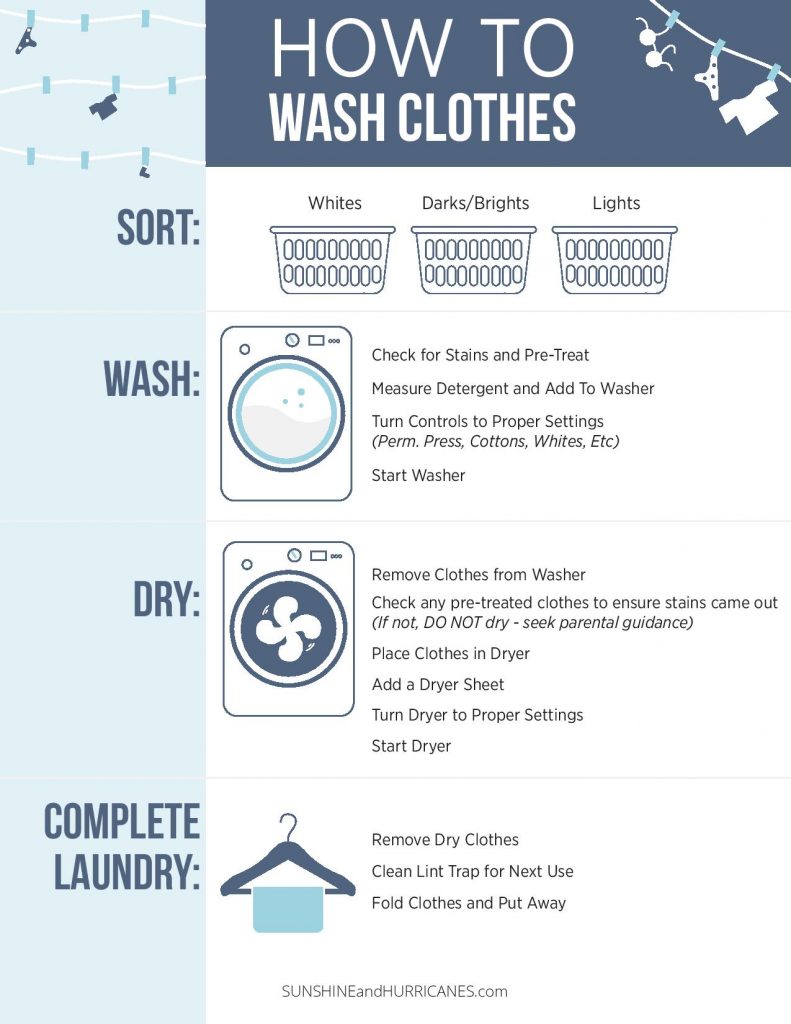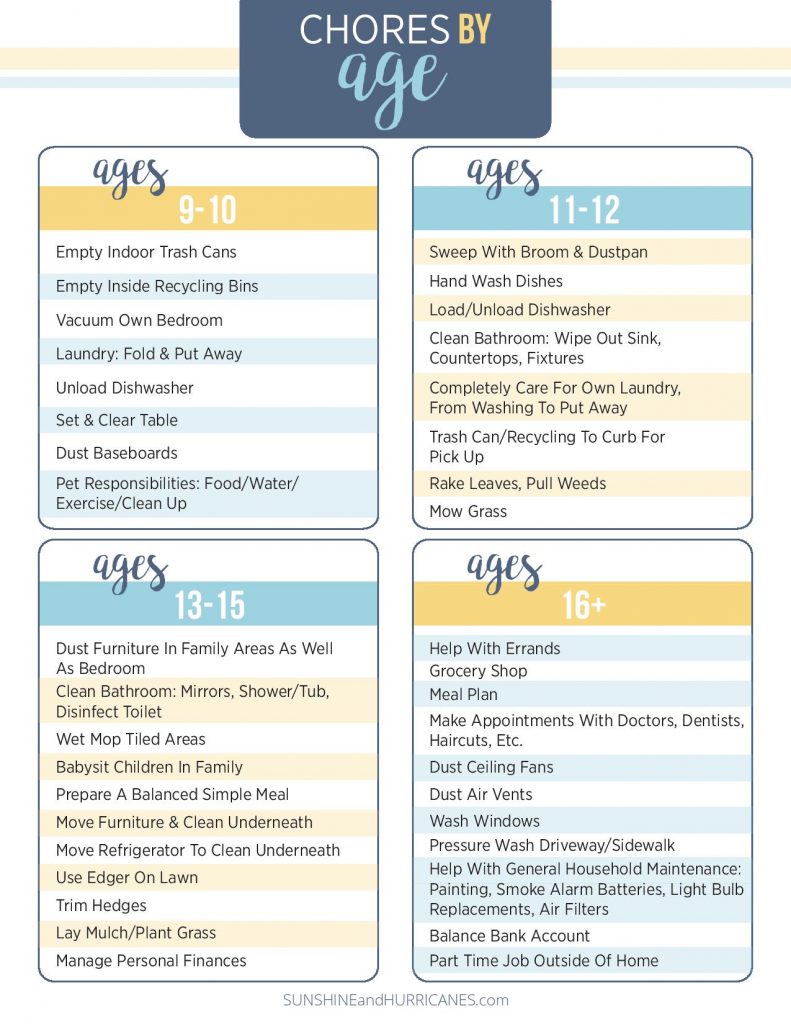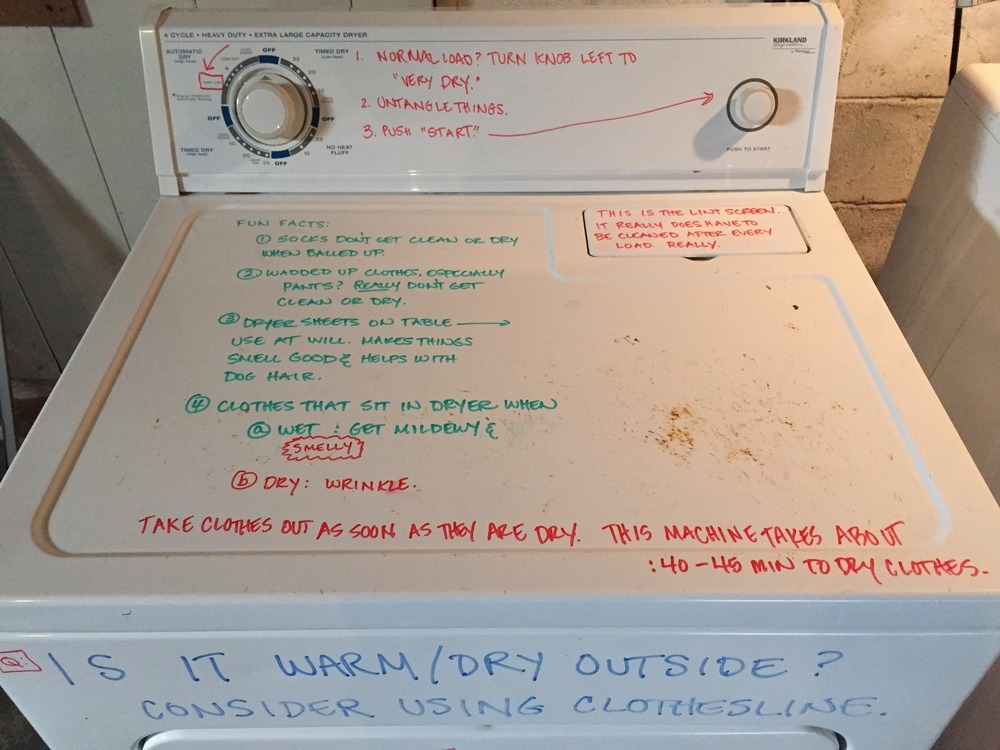Inside: Any child in middle school needs to be doing regular chores. Chores help tweens learn valuable life skills and also improve confidence and responsibility.

Middle School.
If there is any season of life that brings stress and anxiety to parents and kids alike, it’s these awkward in between years.
Few of us look back on this time of our life with great affection. Braces, acne, bad fashion choices. You remember I’m sure. Unless of course you’ve blocked it out.
As we watch our kids go through this phase, it can be painful. Sometimes we wonder if they (and we) will survive, let alone thrive.
Part of helping them grow into the confident and capable young adults we know they can be is making sure they have the skills that are not only necessary to do well in school, but in life. Having guided one child successfully through middle school and having another one on his way, I have come up with following 10 Tween Chores Your Middle Schooler Needs to develop those important life skills for adulthood.
Based on your own child, you will have to decide on the age-appropriateness of each. But these are definitely all like skills its good for tweens to know how to do by the time they become teenagers.
10 Tween Chores – Life Skills Essentials
Manage Technology Responsibly
Technology is already a huge part of your child’s life and teaching our kids to use technology appropriately is our responsibility. Chances are, your middle schooler doesn’t need lessons in how their phone or tablet operates but they do need boundaries and safety instruction. You’d never hand the keys of a Ferrari to an unlicensed 12 year old but there’s just as much danger in handing over unmonitored access to technology.
Your child may have been playing on the family computer or iPad for years, but often that involves far more parental involvement. As they get older, freedom of access to technology usually comes through cell phones. So, the first, and most important thing you need to ask yourself is if your child is ready for a cell phone? Some kids in middle school really aren’t ready yet and don’t feel pressured to give them one just because “everyone has one but me.”
If you do move forward, have your child sign a cell phone contract. We’ve got a printable one that covers the basics for you in our post Cell Phone Rules for Tweens and Teens. This sets expectations and shifts responsibility from you to them. It’s an important step in developing accountability.
Lastly, while some children are given access to social media in middle school, before you make your decision please read our post about What Every Parent Needs to Know About Social Media for Kids. Most social networks require or suggest a child be a minimum of 13 years old before joining.
Do Their Own Laundry
In our home, we have a tradition that when one of our kids starts middle school, they get their very own laundry basket! YEAH! Up until this point, they’ve had to help with doing laundry, such as folding and putting it away, but now they take on total ownership start to finish.
This means, if they have a practice or game coming up, they need to keep track of whether or not they’ve got a clean uniform and if not, time to do some laundry. Also, mine wear uniforms to school too, so they have to stay on top of making sure they’ve got the proper clothes ready for each day. A nice bonus to having them do their own laundry is that they are less likely to throw hardly worn or never worn clothes into the hamper just because putting them away is too much of a hassle.
Now, I don’t throw them to the wolves. I walk through the laundry operations a few times with them and provide supervision to make sure there are no big laundry disasters (pink shirt in with the whites). We’ve also got a great printable that we’ve hung over our washer and dryer in the laundry room to help them in case they forget a few steps.
Sign-up for our weekly newsletter full of tips and advice to help make parenting a little easier and get your FREE Laundry Printable right away!

Or you could do what this mom did….
Make Bed/Change Sheets
I’ve heard from more than one parent that their Freshman college student is at a loss when it comes to knowing how often to wash their dorm bed sheets much less how one remakes the bed afterwards. Middle school is a great time to start this skill so it’s pretty much habit by college.
Now that they’ve learned to do their own laundry, sheets can absolutely be a part of this new chore. General guidelines suggest sheets be washed every one to two weeks. Much of this is personal preference, so go ahead and have them follow your wash schedule on this one. But make sure they know that if they’re sick, bedding should be washed as soon as they’ve recovered to prevent germs from spreading or re-infection.
Help them with the basics of making their bed the first few times and realize that they’re probably not going to care about hospital corners. After that, they’re on their own.
Wake Up On Their Own
You’re probably in the habit of functioning as your kiddos alarm clock but learning to wake up on your own is a definite skill, especially if you’re not raising a morning person. The day will come when you won’t be there to make sure they’re not snoozing through their morning math class or late for work.
This is why figuring out what time they need to get out of bed so they can get ready and leave at a designated time is a good life lesson to start by middle school. It also helps them to realize the importance of sleep and how much easier it is to get going in the morning when you’ve gotten enough z’s. Tweens really need about 9 hours each night to be fully rested.
Resist the temptation to save them from the consequences of not getting them up on their own. If they sleep through their alarm it could simply mean having to go to school without their hair done or having to miss breakfast or it might mean being tardy and a detention. Either way, it drives home the importance of being on time and will help them develop their internal motivation to mastering this skill.
If you need a little help moving the process along and want to add a little creativity to this part of their morning routine, here are some unique alarm clocks, perfect for the tween or teen in your life.
Here are several (sort of) old school alarm clocks for teens:
Buffbee Sound Machine & Alarm Clock 2-in-1, 18 Soothing Sound, 7 Night Light, Sleep Timer, Precise 30-Level Volume Control White Noise MachineJALL Wake Up Light Sunrise Alarm Clock for Kids, Bedroom, Full Screen with Sunrise Simulation, Dual Alarm, FM Radio, 15 Nightlights, 8 Sounds, Sleep Timer
CLOCKY Extra Super Loud Alarm Clock for Heavy Sleepers Adults Kids Teens Bedroom, Move Jump Roll Run Away Easy to Set Smart Digital Alarm Clock on Wheels -Funny Gag Gift (Black)
Pump Gas
You’re probably so in the habit of doing this that it may not have have occurred to you to teach this, but there’s no time like the present! This simple task is perfect for your tween and gives you a few minutes to jam out to your favorite songs while he or she dealing with the gas pump.
It’s also a quickie personal finance lesson. There is a good chance your kid has no idea how much gas costs or how often you need to fill-up. As they are getting ever closer to the day when they will behind the wheel of a car, making them aware of these details is a good starting point.
Keep a calendar
Time management starts here. Taking responsibility for what time practices/games start, social events, appointments or school project deadlines are life skills that he’ll need to be a successful adult. We started with a large board like this one, in a central part of home so it was easier to keep track for all of us. After utilizing that successfully, it’d be a good time to switch to an individual planner or find a digital system that suits your needs.
Here are several popular planners for tweens and teens:
Big Life Journal – Teen Edition: A Growth Mindset Journal – Interactive Journal for Teens with Writing Prompts – Journal for Teens & Tweens – Inspirational Goal Planner Guided JournalJUBTIC Homework Planner, Student Planner for 2024 2025 Academic Year, School Planner for Elementary, Middle/High School, College Students, Undated Assignment Notebook, Academic Planner 8.5
Simple Elephant Undated Planner for 2024 – Monthly, Weekly, Daily Planner – Leather Agenda Planner W/No Bleed Pages & Pen Holder – College, Work & Business Calendar Book
Homework Planner for Kids in Elementary, Middle School and High School – Undated Weekly and Daily Pages, Waterproof Cover ADHD Kids Planner Notebook
Prepare A Simple Meal
Breakfast and snacks are a great place to begin this training. Whether it’s frying eggs or an after school grilled cheese, using the oven and stove top helps him or her work up to more involved cooking. We worked up to easy meals with simple ingredients like spaghetti, mac & cheese, browning ground beef and more as time progressed. I also gave my kiddos boxed brownies or cakes to learn the ropes of following a recipe, measuring, and general baking skills.
I was hands off during this and left the kitchen so I could resist the urge to step in. Remember, basic cooking is a lifelong help and may even spark an interest in more involved culinary skills. And don’t forget to let them know they’re responsible for clean up, too!
There are also several great teen cookbooks you can check out:
101 Recipes Every Teen Needs To Cook: Quick & Easy Favorite Meals Everyone Will Adore (with Fun Tips & Facts) (Cookbook For Teens)MasterChef Junior Cookbook: Bold Recipes and Essential Techniques to Inspire Young Cooks
The Complete Cookbook for Young Chefs: 100+ Recipes that You’ll Love to Cook and Eat
The Healthy Cookbook for Teens: 100 Fast & Easy Delicious Recipes
the complete cookbook for Teen chefs: 200 simple step-by-step recipes and essential techniques to inspire young cooks
The Cookbook for Teens: The Easy Teen Cookbook with 74 Fun & Delicious Recipes to Try
How To Make Eye Contact And Shake Hands
We’re going to assume that your child has basic manners and the etiquette of “please” and “thank you” down by now. However, because children today spend way more time with screens and virtual interactions than you and I did while growing up, many are lacking some essential social skills.
In the recent article, 13 Things About Manners Gen-Xers Know That Their Kids Won’t, the importance of eye contact and a solid handshake are singled out as an issue for today’s young people. In the article it states, “Children today do not learn to shake hands while looking the other person in the eye. Glued to their devices, (they) are allowed to be isolated while still amidst other people. But a good handshake is the beginning of a relationship—you don’t want to botch that initial greeting.”
This is why we joke that my hubs is the handshake police in our family. Definitely from the school of thought that you learn a lot about a person in the way they introduce themselves, he started coaching our kids pretty young on this skill.
Eye contact isn’t just important when shaking someone’s hand. We can help our kids in this area by encouraging them to look us as well as their siblings in the eye when talking. Also, when you are dining out, whether ordering from the counter or sitting down at a table, let your child tell the server what they would like to eat and make sure they look the person in the eye while doing it.
Regular Healthy Teen Hygiene Habits
If you have a tween, you’ll know that this is not intuitive. Tweens, particularly boys in my experience, are fairly noseblind to their own aromas and even personal appearance. It took months of saying, “Yes, you do need a shower everyday” for my son to realize this was non negotiable. And there were still times he exited the shower without washing his hair…
Applying deodorant, styling hair, managing oral hygiene, especially if braces become a factor, and teaching good skin care are areas that need to be addressed during middle school, if not sooner. My daughter did almost all of this on her own, after guiding her in the process, and my son has done well but with more reminders and a definite learning curve.
How To Do Basic Household Chores
We’ve covered some of the tween chores that really help your child build life skills they will need as they move closer to independence. But basic and less glamorous chores, may of which they should already have been doing, also need to be continued. Here are some that are pretty essential:
- Mopping Floors
- Taking The Trash To The Curb
- Washing Dishes and Loading The Dishwasher
- Running the Vacuum
- Clean Bathroom (including washing the sink and cleaning toilets)
- Sweep
- Dust
- Mow The Lawn
- Rake Leaves
- Help With Grocery Shopping (And Know How Much Groceries Cost)
- Basic Money Management
- Babysitting
If you haven’t had your tween doing these chores, now is the time to start. Being a contributing member of their family is good for kids. It gives them a chance to learn responsibility and also to develop a work ethic. Many studies show that kids who do chores are often more confident because they develop a sense of pride when they see what they are capable of, feel closer to their families and even do better in school. So don’t feel bad making them take out the trash. It’s good for them!
If they need a little extra motivation there are also some great chore apps out there that might combine their love for all things technology with the incentives they need to stay on top of their new responsibilities. Our favorite is Green Light, and you can read more about it on our sister site parentingteensandtweens.com by clicking HERE.
In case you’re not sure about what are age-appropriate chores here’s a handy printable chore list that will actually take you all the way through their teen years.
Sign-up for our weekly newsletter full of tips and advice to help make parenting a little easier and get your FREE Chore Chart Printable right away!

If you liked this post on tween chores, don’t leave without checking out these other ones….
The Importance of Chores for Children (Printable Chore Chart)
9 Essential Soft Skills for Teens and Tweens
Teaching Kids To Manage Money Early – A Must-Have Life Skill for Financial Literacy
Are there any other tween chores you would add to this list?





















Cindy says
Chores on our list also include change any light bulbs and change the air filters. (They need a sibling to help safely negotiate the ladder.) If your kiddo isn’t ready for washing real dishes; start with washing the pets’ bowls. 🙂 Also, taking care of their own sports equipment: unpacking, washing, etc.